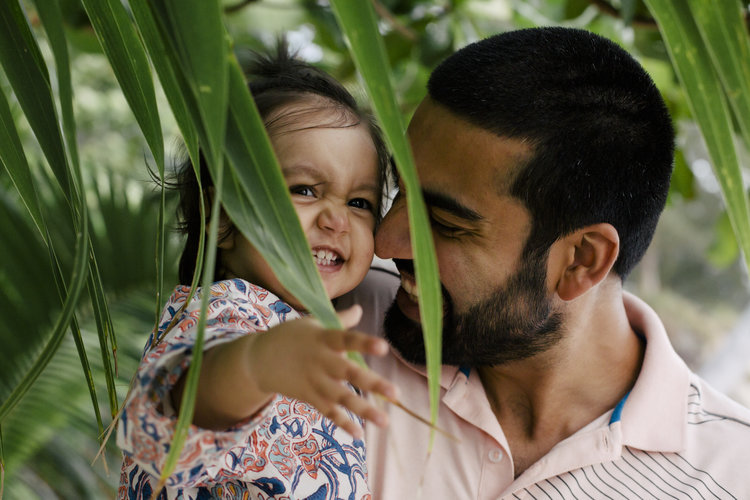
There is no doubt that a vegan diet is appropriate for all stages of life. This is the position statement from the Academy of Nutrition and Dietetics, “It is the position of the Academy of Nutrition and Dietetics that appropriately planned vegetarian, including vegan, diets are healthful, nutritionally adequate, and may provide health benefits for the prevention and treatment of certain diseases. These diets are appropriate for all stages of the life cycle, including pregnancy, lactation, infancy, childhood, adolescence, older adulthood, and for athletes.”
As a Vegan, a parent, and a nutritionist, I want to discuss the topic of plant-based nutrition for children. Quite often as parents who have chosen to feed our daughter a Vegan diet, consisting mainly of whole plant foods, we get asked the question about how we ensure that she is getting adequate nutrition from the food that she eats. Our society is conditioned to believe that our children need to eat meat and dairy to ensure their nutritional requirements are met. I also notice that Vegan parents are always trying to defend their choices and wanting to show that a Vegan diet has sufficient protein, calcium, and other essential nutrients to help their children grow.
Because a Vegan diet has been proven beyond a shadow of a doubt to be suitable for all stages of the life cycle, I am not going to try and prove that a Vegan diet is okay for children and how they can get certain nutrients. I am going to focus on what Vegan children are not getting and why choosing a Vegan diet for your child is one of the best health decisions you can make for them.
So, what are Vegan children missing out on by not eating meat, dairy, eggs, and fish? Lifestyle diseases. I am not saying that a Vegan cannot get an illness or disease, that would be naïve, and a Vegan diet can be unhealthy if it is full of processed foods, which are getting easier to access every day. However, a whole food plant-based diet that avoids (for the sake of sanity I will suggest that we avoid these foods as much as possible) processed fats (such as oil), processed carbohydrates (such as sugar and white flour) and processed proteins (such as fake meats and protein powders) have been scientifically proven to prevent 14 out of the top 15 causes of death in the western world. The one cause of death it cannot avoid is death by accident.
Why are we not talking about this more? A Vegan diet, consisting mostly of whole plant foods is protective for so many conditions, Harvard Medical School released this statement, “Traditionally, research into vegetarianism focused mainly on potential nutritional deficiencies, but in recent years, the pendulum has swung the other way, and studies are confirming the health benefits of meat-free eating. Nowadays, plant-based eating is recognized as not only nutritionally sufficient but also as a way to reduce the risk for many chronic illnesses.”
So, the question should not be, ‘why are you feeding your children a Vegan diet’, but ‘why are you not?’. Recently the World Health Organisation stated that processed meat is a Class 1 Carcinogen (meaning it causes Cancer) and that red meat is a Class 2A Carcinogen (meaning that it probably causes cancer). Processed meat is a staple food for children in Western Society. From luncheon meat in sandwiches to pepperoni on pizza and sausages, bacon, or chicken nuggets, it can be found in most children’s diets. These foods are Cancer-causing in the same class as cigarettes and asbestos!
Cow’s milk has been linked to a host of childhood health issues. These issues include a link to Type 1 Diabetes, constipation, infant reflux, infant colic, and eczema. It should come as no surprise that the milk from another species is not designed for humans. Cow’s milk has high levels of saturated fat, cholesterol, hormones such as oestrogen, antibiotics, and is also known to contain pus (somatic cells) and blood. Since there is no need for cow’s milk in the human diet, it is best to avoid it, rather than take on the risk that it may contribute to health issues for your child.
Human breastmilk provides complete nutrition for babies and beyond infancy. We should consider exclusive breastfeeding for a minimum of 6 months, but the longer we continue breastfeeding the better, as the benefits go beyond nutrition. Breastfeeding has been shown to provide immune defences for babies, helps to generate a beneficial gut microbiome and provides emotional support and comforting to the young child. In today’s society we need to consider providing more support to women who want to breastfeed as this key decision can be extremely beneficial to a child’s long-term health.
As we are ignoring this vital information, we are setting our children up to fail health wise, and no-one wants to talk about it. For example, let’s look at Heart Disease, which is the leading cause of death in the western world. Fatty streak formation occurs in human foetal arteries and is greatly worsened by how high the pregnant mother’s cholesterol is. Arteries were obtained from spontaneous miscarriages and premature new-borns who died within 12 hours of birth right around the end of the second trimester. They looked at the arteries of foetuses from mothers with normal cholesterol levels and from pregnant moms with high cholesterol. Foetal arteries from mothers with high cholesterol contained dramatically greater lesions.
It was a landmark article, published in 1953, that radically changed our view about the development of heart disease forever. A series of 300 autopsies performed on U.S. battle casualties of the Korean War, average age 22. 77% of these young men had “gross evidence” (which means that the evidence was visible to the eye) of coronary atherosclerosis, a hardening of the arteries. Some of the subjects studied had blood vessels that were clogged off by 90% or more!
As an editorial in the Journal of the American Medical Association concluded, “This widely cited publication dramatically showed that atherosclerotic changes appear in the coronary arteries years and decades before the age at which coronary heart disease becomes a clinically recognized problem”. That is, before symptoms arise. Follow-up studies on the hearts of thousands more soldiers over the subsequent years confirmed their results.
How young are children when we start seeing a hardening of the arteries? Fatty streaks, the first stage of atherosclerosis were found in the arteries of 100% of kids by age ten. What’s accounting for this build-up of plaque, even in childhood? In the 80s, we got our first clue, with the now-famous Bogalusa heart study, looking at autopsies of those dying between the ages of 3 years old to age 26, and the #1 risk factor was cholesterol. Plant foods do not contain cholesterol.
Therefore, the question for most of us reading this is not about how we can prevent Heart Disease, but how do we reverse the Heart Disease we already have! A whole foods plant-based diet is the only scientifically proven way of preventing and reversing Heart Disease. This should be the default diet not only for our children but all of us.
While there may be a lot of confusing information on the internet and in the media. The science is clear on the benefits of a Vegan diet, consisting mainly of whole plant foods, for every stage of life. We always want the best for our kids, and I for one am glad to have chosen a Vegan diet for my daughter. My experience with my daughter and many other Vegan parents has shown me how children thrive on a Vegan diet.
Vegan children are not missing out on essential nutrients, in fact, a well-planned Vegan diet is nutrient-dense and able to provide more than enough to meet the needs of growing children. Plant foods have so many benefits for our health, including dietary fibre, antioxidants, phytonutrients, and polyphenols. All nutrients are found in the soil and therefore, let’s bypass the ‘middle-animal’ and go straight to the source, which is whole plant foods. I guess our parents and grandparents had it right all along when they insisted that we, like children, eat our fruits and vegetables.



